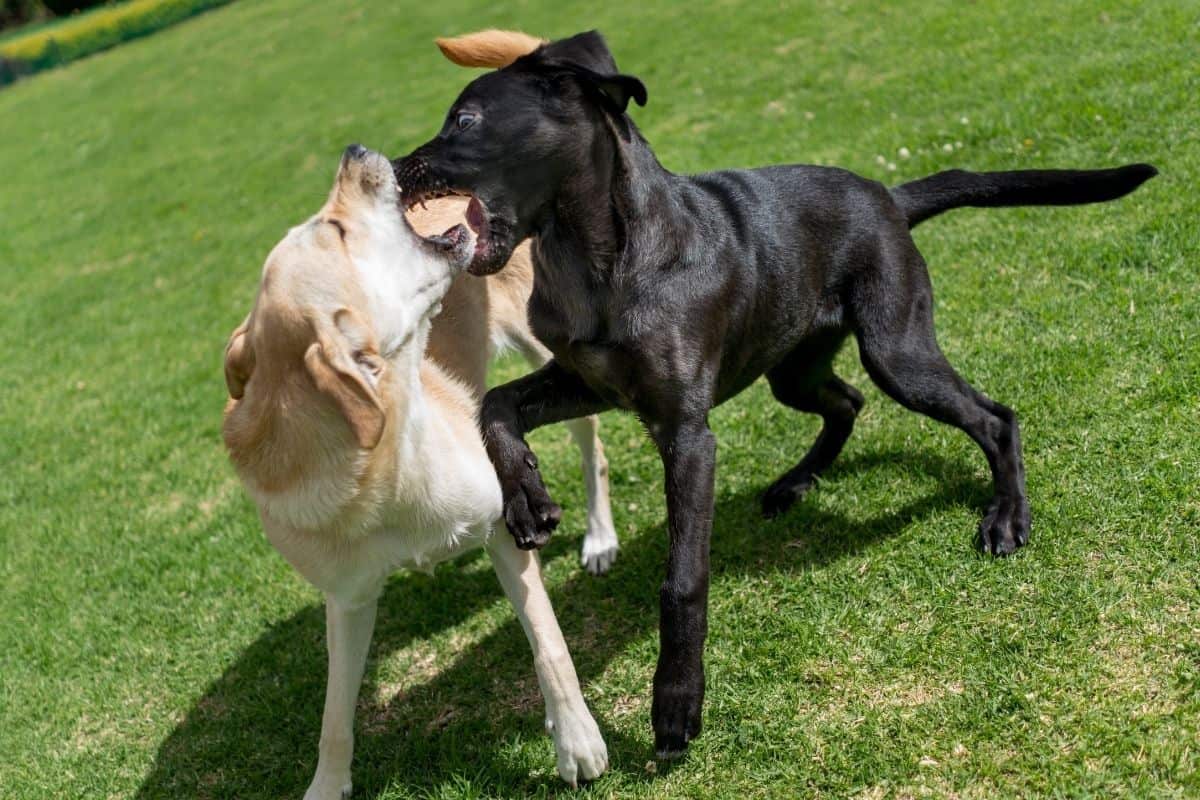Dog owners love having multiple dogs. There are a number of reasons for this, whether out of a wish for more companions for their older dogs or simply trying to breed dogs to improve the breed. There is just something attractive when you see a sign saying mini schnauzer for sale or bichon frise for adoption. They are just simply irresistible. Most household dogs are family pets and get along well with other dogs and even strangers. However, things don’t always go as planned – it often happens that your new dog will be initially happy and well-behaved, then suddenly start fighting with your older dog.
Preventing your dogs from fighting can be a frustrating and worrying experience, especially if you have a larger breed such as a German Shepherd or a feisty terrier like a Jack Russell. Keeping dogs from fighting is an important part of owning multiple dogs, as it prevents injuries and stress for both you and your dogs. Fortunately, there are a few steps that you can take to ensure that your dogs stay calm and get along.
Why Do Dogs Fight?
Dogs are social animals that thrive in the company of other canines, but there are times when they can become aggressive with one another. While some dogs may simply bark and growl to show their dominance over a rival, some dogs will actually fight.
It is important to remember that dog fights should not be taken lightly. They can result in serious injury or even death for one or both of the dogs involved. Knowing how to recognize the signs of aggression in dogs and understanding why they might fight can help prevent such incidents from occurring in the first place.
Territorial Disputes
One of the most common causes of canine aggression is territorial disputes between two dogs living in close proximity to each other. Dogs naturally want to defend their spaces and may become aggressive towards another dog if they perceive it as a threat.
Dogs may also try to establish dominance over an unfamiliar dog by displaying threatening body language such as growling and baring their teeth; if this behaviour is not redirected or stopped before it escalates, a fight may ensue.
Competition for Resources
Resource guarding is another common reason why two dogs might come into conflict with one another. Dogs may compete for food or toys that have been left out unattended, leading them to display aggressive behaviours like snarling and snapping at each other.
This type of aggression often happens when multiple dogs are sharing the same space without proper supervision from an owner who can ensure that resources are being shared fairly and safely among all of them.
Misunderstanding of Body Language
In some cases, two dogs who encounter one another for the first time may misinterpret each other’s body language as hostile rather than friendly. For example, if a dog approaches another with its tail wagging but its ears flattened against its head (a sign of fear), the other dog may take this as an act of aggression and respond defensively by growling and barking.
If this initial reaction isn’t corrected quickly enough by the owner, then it could lead to an altercation between them which could potentially escalate into a physical fight.
How to Keep Your Dogs From Fighting
Managing Your Space
The first step in preventing dogs from fighting is to make sure that they have plenty of space. Dogs often become aggressive when they feel crowded or threatened. It is important to provide each dog with their own bed or crate and enough space so they can move around without feeling cramped.
If you are living in a small space, consider blocking off a room or section of your house for each dog. This will give them each their own territory and lower the chances of conflict.
Limit Rough Play
It is important to establish boundaries for the play that can happen between your dogs. It’s natural for dogs to get excited when they start roughhousing – which can then lead to an escalation in behaviour as each dog gets more and more worked up. This kind of situation is generally deescalated by one dog, but if neither backs down it could turn into a fight.
Train your dogs to break off and come to you no matter what – this is why recall training is so important. You can use this command to interrupt the play, giving you a chance to praise and reward each dog with a high-value treat for not pursuing the fight.
Allow Your Dogs Some Downtime
Dog owners are usually fine with their dogs being “on” all the time, as they tend to be high-energy animals who love to play. However, they also need downtime when they have to be calm and relaxed. A designated quiet time or nap time for your dogs can help them learn to be more gentle and easygoing.
Call a Professional
If the situation has escalated and cannot be managed on your own, it’s important to get professional behavioural help. If your dogs have already fought and have caused injury to one another, they should be evaluated before being allowed to interact again. Make sure to hire a canine behaviourist who uses positive reinforcement and who has experience with dogs in the same household fighting.



